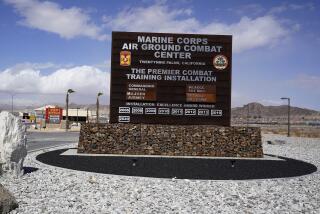Marines Getting Into Peak Condition
BRIDGEPORT, Calif. — In rugged mountains that resemble Afghanistan, U.S. Marines are rappelling down 400-foot cliffs, crossing rocky gorges, hiking for miles in the high thin air, and eating bugs, lizards and wild plants.
Nobody is saying whether graduates of the Marine Corps’ Mountain Warfare Training Center, 21 miles north of here in the High Sierra, will be sent off to a war half a world away. But, they say, they will be ready.
“If called to go there for whatever reason, I’d go, no problem at all,” said Sgt. Alan Quartararo, 26, as he prepared to slide upside-down along a 100-foot rope strung more than 60 feet over a river.
“It’s good to know I have the training, just in case that were ever to happen,” said Cpl. Elias Gonzales, 23, as he and several other Marines--in combat fatigues, with M-16 rifles, 45-pound packs, and black and green camouflage grease daubed on their faces--waited their turn on the rope. “There’s no doubt in my mind that if that were the case, we could handle it.”
About 10,000 Marines a year go through the regular four-week training at the only high-altitude military training base in the United States. The Marines scale cliffs, set up rope bridges, march at high altitudes in summer or learn combat skiing during snowy winter months.
Several hundred go through even tougher training, learning to lead troops in the wild in all seasons, forage for food and dodge enemy soldiers.
Trainees in the advanced survival program lose 15 to 20 pounds on average in two weeks as they learn to live on fish, worms, grasshoppers, snakes, rabbits or other small game they snare. They also learn how to cook a soup from more than a dozen plants, including gooseberries, stinging nettle, yarrow and watercress.
“It was the worst-tasting thing I ever had in my life,” said Lt. Steve St. John, 25. Still, St. John said he enjoyed the survival training. “People pay to do this stuff, on vacations. We’re getting paid to do it.”
The Mountain Warfare Training Center, staffed by a force of 250, has an idyllic, resort-like look at first glance. It is on the edge of postcard-perfect Pickel Meadow, which is traversed by the West Walker River. Pines and aspens cover surrounding mountains.
The training center was established in 1951 after the military learned some hard lessons in the “Frozen Chosin” campaign of the Korean War.
During winters here, the snow can pile up to 10 feet or more at higher elevations. Temperatures range from 20 below in winter to more than 90 above in summer.
“When I first came here, it kind of took my breath away,” said Capt. Clinton Culp, 35, a 17-year Marine Corps veteran who helps run the unit. “But usually within a few days you acclimatize. I can run up to 14,000 feet now without a major loss of breath.”
Those who go through the advanced courses in winter and summer survival, leadership, high-altitude medicine and other training return to their units to pass along what they have learned.
The trainees are mostly men from Marine infantry battalions. But they also come from other branches of the service, as well as other countries.
Base security has been tightened. Entrances once open to hunters or hikers are barricaded.
“We keep up a fairly high level of training and intensity,” Culp said. “But certainly this has added an extra notch.”
Even before Sept. 11, Culp said, staffers and trainees realized that the base, at 6,765 feet, is at an elevation similar to that of Kabul--”and everything we do goes up from there.”
“The training here is very similar to what someone would find in places like Pakistan or India or Afghanistan,” he added. “We go from about 6,700 to close to 12,000 feet.”
To the south, peaks in the Sierra are higher than 14,000 feet. Some of the base staffers tackle those in their free time.
More to Read
Sign up for Essential California
The most important California stories and recommendations in your inbox every morning.
You may occasionally receive promotional content from the Los Angeles Times.










